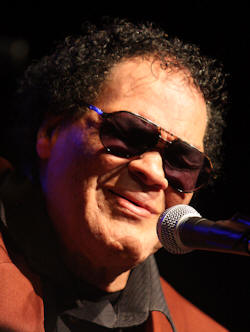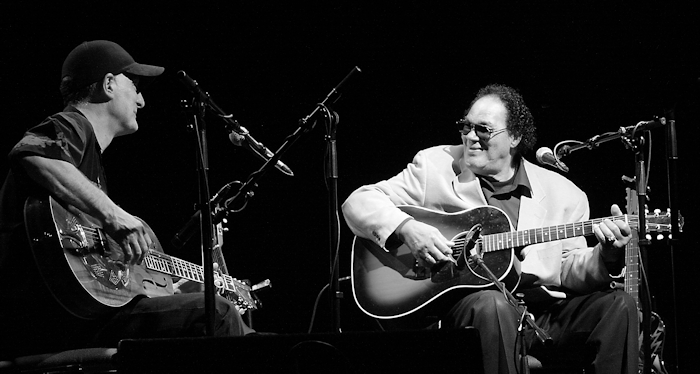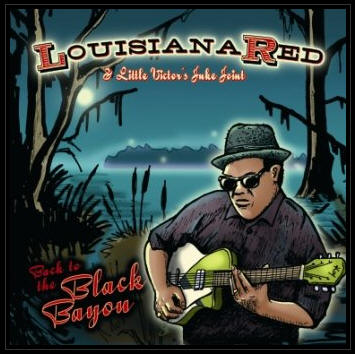
Painting © 2004 Loz
Arkle
Website
© Copyright 2000-2011 Alan White - All
Rights Reserved
Site optimised for Microsoft Internet Explorer



Early Blues Interview |
|
Louisiana Red recently toured the UK with Michael Messer - "A collaboration of two great musicians from totally different backgrounds, brought together through a passion for playing blues slide guitar and many years of mutual admiration for each othersí work". I had the privilege of interviewing Red at Southport Arts Centre in conjunction with Spencer Leigh, BBC Radio Merseyside. Spencer: Can we start with your background Red? I think your father was killed by the Klan. When did you find that out? Red: I was five years old and it was in 30s. It was a terrible scene. My grandmother got a telegram and in those days they put 5 stars on it when somebody died and then I found out later that it was the Ku Klux Klan who killed him. They brought the body to our place in Vinesfield, Alabama. I just grew up and I hated all these white people. But when I got in the army I learned a lesson and some of the best friends I had was white people. Sometimes I wouldnít get no letters from home and theyíd get packages with fruit and theyíd share with me, and that changed my heart around. Thatís why I still say today that there is no black and white, itís just musicians working together. Michael [Messer] is one of the sweetest musicians I ever worked with. Iíve worked with many in Germany, where I live after I had to leave Chicago because there wasnít much work there. I came to an American Folk Blues Festival and I began to live with Champion Jack Dupree. Iíve been calling him Grandfather since I was out of the orphanage. I came over here to start working at the Festival. We later moved to Pittsburgh, Pennsylvania after my Daddyís funeral and then we moved to Cannisburg and stayed out there for a while. After the funeral my grandmother took me to Pennsylvania and my aunt put me in an orphanage. Spencer: I presume in those days they didnít even try to find out who the culprits were? Red: No, no, no Spencer: Itís amazing to think that was only 70 years ago. Red: I asked my grandmother how my mother died. She said she died from pneumonia, got while she was following her fatherís funeral hearse to the graveyard. She died 7 days after I was born. So I was brought up in hardships but now itís beginning to lighten up and open up for me.
Spencer: And how did you get involved in music? Red: It was in the orphanage. I used to sit in a corner and read my bible, just like you see here. Kids would laugh at me and tease me and Iíd say to myself that one of these days I would make something out of myself. My grandmother on my fatherís side came and got me out of the orphanage and I began to hang around these street players in Pittsburgh and I got in touch with the music and used to hang around with older people than I was. I was around 13 or 14 but Iíd hang around with older people. Iíd go to joints which were dangerous and Iíd hang around to hear the blues. It got to me, inside. I tried to learn drums at drum school, tried violin lessons but something was missing. It was only when I got a record by Arthur Big Boy Crudup and heard that kind of music and it got to me and I knew I had to learn the guitar. My grandmother bought me a Stella and I started playing on the streets and I finally got there. Then I met the great Muddy Waters in 1949 or 51. I was in my teenage years then and Leonard Chess came and got me out of Pittsburgh, Pennsylvania. After I had called into Aristocrat Records and run my auntís phone bill for about two hours, I called Chicago where I'd never been and talked to Mr Leonard Chess. I said, ďMy name is "Rocky FullerĒ (that was my street name) and I just loved that record you put out by Muddy Waters. Please send a pictureĒ. And Iíve got that picture now. He said that I could meet him in Chicago. I said ďWhat sort of man is heĒ and he said, ďHeís a big fellaĒ. And sure enough, when I went to Chicago, he came down to the office and Mr Chess said, ďThis is RockyĒ and he said ďHi RockyĒ. They didnít put me in a hotel because it was dangerous and he took me to his house. I canít explain it but it was one of the most heavenly nights I had when I played at the Chess Brothersí Zanzibar club. Thatís why I have Zanzibar on my new CD, in memory of there. My life is blues. Thatís all Iíve known. I was rudely beat by my uncle and I know what brutality is, as I say on my one of my CDs, Earwig. Thatís why every year we go to see the orphans in Ghana, where my wife is from, and I take money to them. When I play in Rome, they collect money for Louisiana Redís children in Ghana. I wrote a book called Nobodyís Child but itís not published yet and all the information is in that book.
Red: Muddy Waters. He used to say that when he came to New York and theyíd ask about the guest list, heíd always say, ďCome on Rocky. Rocky has been following me since he was a kidĒ. He learned me the bottleneck. Spencer: And how did you become Louisiana Red? Red: Thatís a short story. I liked a lot of Louisiana hot sauce so my uncle named me that. Spencer: I can see that Iím saying Louisiana wrongly arenít I? You say it quite differently Red: Yeah, Loosana Alan: Are there any particular songs youíve played that have special meaning to you? Red: I play a song that was written by a dear friend of mine Kent Cooper and he used to own a record company called Labor Records. He wrote the song for me, When my Mama was living, I never had a hungry day. Iíve been starving and crying ever since my dear mother passed away. The wine bottle in my pocket tried to help me day by day. He wrote that song for me and it got to me. I play it softly and sweetly because I never seen my mother in my life and I hope that when I go to the States I will go to Alabama and see Mrs Cory and she has my motherís picture. Iíve never seen my mother in my life but she has a picture. Alan: Of all the 50 plus albums that youíve released, which is your favourite? Red: I donít know why it is but I guess itís that album there, Low Down Back Porch Blues. I recorded it in 1960. Henry Glover, the A&R man recorded me. Spencer: He wrote Redís Dream for you on that didnít he? I always love songs that mention other people and thatís one of those. Red: And the other songs, I wrote myself, ďI am Louisiana Red". Spencer: You did a song on the death of your first wife, which is one of the most powerful songs Iíve ever heard. Is this something you perform regularly? Red: The Death of Elise. Iím a little aggrieved because when the German producers of a documentary took me to Georgia, my son took us to the graveyard and I had to play that song in the film. I hated to do that. When I saw that in the film, I just felt let down. I guess Robert was thinking of his mother but it affects that boy now. Spencer: I presume itís very emotional when you do it on stage? Red: I donít do it on stage anymore. I donít perform it now because I just break down Alan: Red, what is your favourite guitar? Red: My favourite guitar? I wish! Ladies and Gentlemen, I want the Muddy Waters guitar that Fender discontinued making. If Michael can find me one somewhere, I would be so grateful Ė that is the one I want. They went and copied it in Cleveland and I was promised one but never got it, so I just hope one is around. It means a lot to me and I want it! It means a lot because I played his guitar a lot myself, many times, when he was there with me. Heíd sing and Iíd be playing his guitar and it was like a jewel to me. If the Fender people have mercy on me and make it up again, Iíd be so appreciative. [NOTE from Michael Messer -Two days after the UK tour finished, I found a Fender Muddy Waters Telecaster and had it shipped to Redís home in Germany. Sorted!] Spencer: Which is the Muddy Waters record that really turns you on? Red: Standing Around Crying or Feel Like Going Home, when he was playing with the glass bottleneck. I know all about the necks he had. Michael tells me Iím a slideologist. I got slides in Ghana, guitars in Ghana, guitars in Germany, guitars in the States...I just love my music. Alan: How healthy do you think the blues scene is in Europe compared with the US? Red:
Itís beginning to pick up now in the US. I go there every year and they
accept me there now. I play BB Kingís Club two times and I play the
Chicago Festival three times. Blues is very high there now. In
Germany, they love the blues, and Italy and France. Red: Yes, it is. The blues comes from the church, from Gospel. If you hear Gospel, youíll hear blues. I asked a friend of mine why every jazz festival has to have a blues artist there and he said itís because jazz is the baby of the blues. Spencer: In the early years, people like Ray Charles did songs based on gospel and people frowned upon it. There was a real division then. Red: It was kind of gospel-style Alan: To me, gospel is the other side of the coin to blues. Ultimately, they are one and the same thing. Red: Yes, even me, I did a gospel record on my new CD, Donít Miss That Train. I was brought up in the church and was in the church choir and I donít forget my gospel singing. Sometimes at home, I play some gospel music on my CD, like Mavis Staples. I met her over the telephone years ago . I met Papa Staples over the telephone but I never got the chance in the 60s to go to Chicago to see them because I was working in a steel drum plant and I couldnít just leave it to go travelling. Spencer: I remember talking to Charlie Louvin of Louvin Brothers and he said his mother would never forgive him if he didnít do a gospel song on stage every night. Red: I do one every night. Alan: Some music styles may be fads, but the blues are always with us. Why do you think this is? Red: Itís a music that is deep, and it was always that way. Itís like Mr Floyd Jones who said, ďThe blues is here and will never die. The blues is here to stayĒ. If one goes away, another comes along, and itís gonna stay around for ever. Spencer: Itís the basis of all contemporary music really. Are you still writing songs yourself? And do you write on the road? Red: Yes, but not on the road. I have a new album - Little Victorís Juke Joint Band was behind me at the Notodden Festival, Norway. The recordís doing pretty good and is due to have a big release in America so Iím hoping it gonna open doors for me. Iím playing in the States after this tour. Iím going to Italy and to a place Iíve never been in my life Ė Albania. Iíve just come from Greece where I have a birthday tour every March. I canít let Johnny Angel down on that! Spencer: This interview will be going out in Liverpool. What do you know about Liverpool groups, like the Beatles? Red: Yes, I used to listen to them. Iíd come in from work and listen to I Wanna Hold Your Hand Ė I like that record. But I got into another record when I heard Chuck Berry. I want to meet him when I go to the US this time. I used to have a little band in New Jersey called ďThe Chuck Berry JuniorsĒ and I loved the song, School Days. Spencer: So you used to play Chuck Berry songs? Red: Oh yes. I had a Gibson Les Paul and Iíd get out there and do the same thing he did.
Spencer: You are touring at the moment with Michael Messer? [Check out tour photos here] Red: Michael is a very good friend of mine. We met in Germany, in Berlin a few years ago. He invited me on a tour with him and we became friends. He gave me a brand new Michael Messer guitar he brought from China and Michael Lewis in Paris built me a wooden-bodied guitar. You know, airlines are dangerous. Two of my guitars got torn up in the States on United Airlines. Iíll never forget this. They didnít try to reimburse me, they didnít try to repair my guitars or replace them. I had a 1951 Kay and I had a 1962 Stratocaster and when I got to the sound check in Mississippi , the Fender neck had fallen down. And then my guitar player, Chris James, he said, ďRed, we canít do anything for it. We opened it up and the whole body is split in parts.Ē A í62 Stratocaster. So now, I carry my guitars on the plane. I donít care what they say. My wife got me a new Telecaster and then Michael Frank of Earwig called me one evening and said ďRed, Chris found your guitar. One like you hadĒ. So I got my green guitar back Ė but this time it stays at home. Spencer and Alan: Louisiana Red, thank you so much. Red: I enjoyed you gentlemen. Itís very seldom I do interviews. Spencer Leigh - BBC Radio Merseyside www.louisiana-red.comCheck out Louisiana Red's latest CD:
If you would like to order Red's new CD -
contact
Red here Return to Blues Interviews List
Website, Photos & Text © Copyright 2000-2009 Alan
White. All Rights Reserved. |





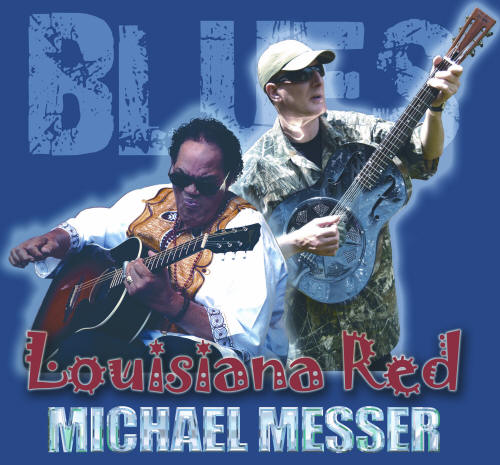
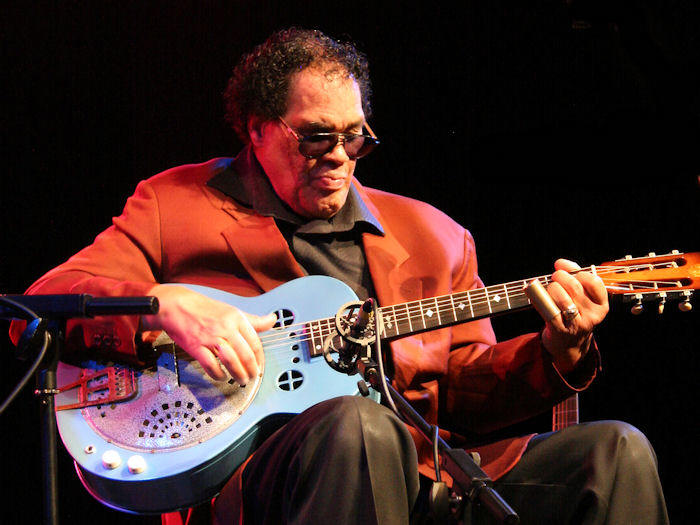
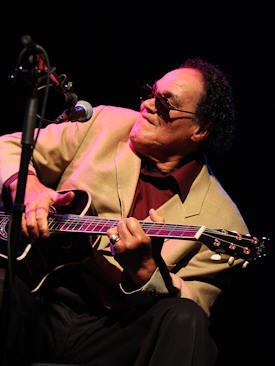 Alan:
Who influenced you the most in your music writing and playing?
Alan:
Who influenced you the most in your music writing and playing?